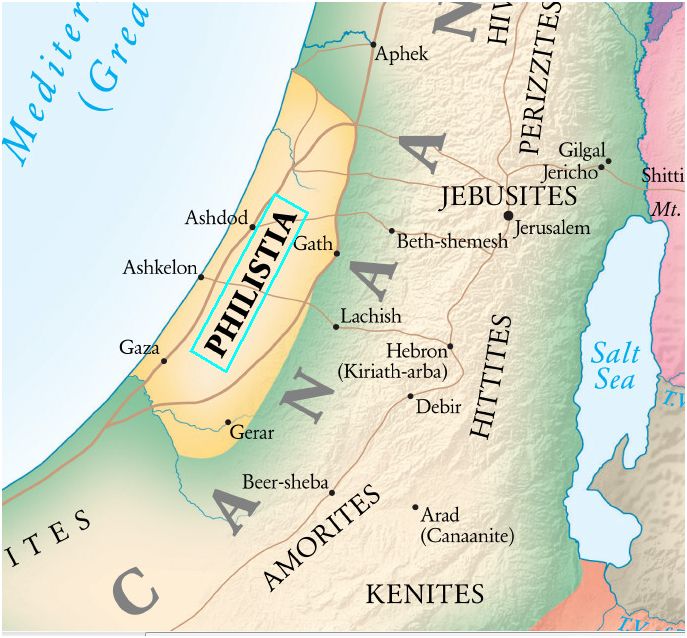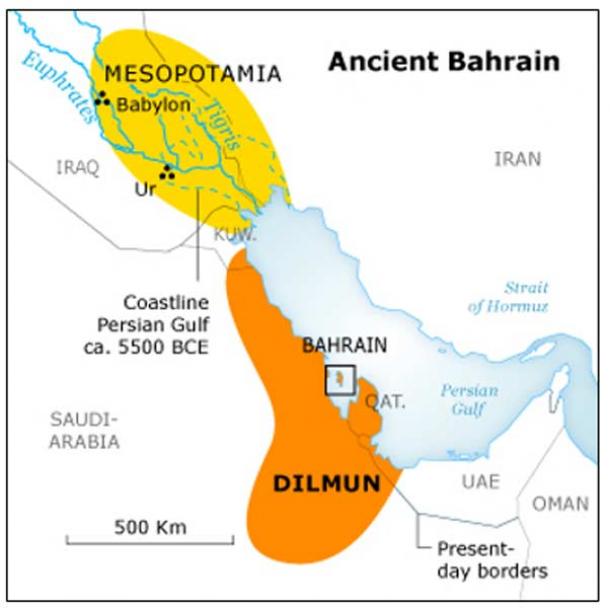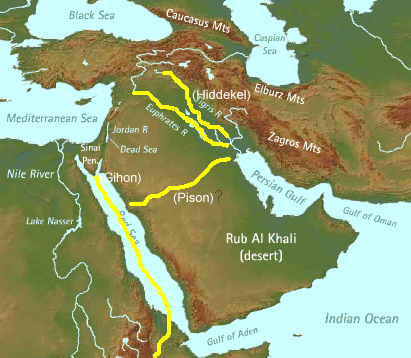sooda
Veteran Member
River Gihon could not possibly flow from Mesopotamia and encompass Ethiopia (Gen 2:13)
B. The name Babel does not come from the Hebrew word 'balbal' or 'confuse' but from the babylonian 'babili' or 'gate of God' which is a translation of the original Sumerian name Ka-dimirra. (Gen 11:9)
C. Ur was not a Chaldean city until 1000 years after Abraham (Gen 11:28, 15:7)
D. Abraham pursued enemies to 'Dan' (Gen 14:14). That name was not used geographically until after the conquest (Judge 18:29)
E. Gen 36:31, telling of Jacob and Esau, lists kings of Edom "before there reigned any king over the children of Israel." This must have been written hundreds of years later, after Israel had kings.
F. Joseph tells Pharaoh he comes from the "land of the Hebrews" (Gen 40:15). There was no such land until after the conquest under Joshua.
G. The Egyptian princess names the baby she finds "Moses" because she "drew him out" of the water (Heb meshethi). Why would she make a pun in Hebrew (Ex 2:10)?
H. No Egyptian record exists mentioning Moses or his devastation of Egypt.
I. Moses refers to "Palestine" (Ex 15:14). No such name was in use then.
J. Law of Moses is the "statutes of God and his laws" (Ex 18:26), but it closely mirrors the Code of Hammurabi, which was penned 1800 BC, hundreds of years before Moses.
K. Priests are mentioned at Ex 19:22-24, but they are not provided for until Ex 28:1.
L. Moses mentions Rabbath, where Og's bedstead is located (Deut3:11). Moses could not have any knowledge of Rabbath,which was not captured by the Hebrews until David's time,500 years later (2 Sam 12:26).
M. Jericho and Ai (Josh 8) were both ancient ruins at the time of the conquest of Canaan, according to archaeologists. Jericho's walls were destroyed centuries before Joshua.
N. Kings are referred to at Deut 17:17-19, before Israel had kings.
O. The Wilderness is viewed as history at Num 15:32, showing that Numbers was written later.
P. The Sabbath law was unknown when the man gathered sticks at Num 15:32-34.
Q. Book of Joshua refers to Book of Jasher in the past, mentioned at 2 Sam 1:18, therefore Joshua must be post-David.
R. Captivity is mentioned at Judg 18:30, making it post-Exile.
S. David took Goliath's head to Jerusalem (1 Sam 17:54). But Jerusalem was not captured until 7 years after David became king (2 Sam 5).
T. David paid 600 shekels of gold for the threshing floor (1 Chron21:22-25). But shekels of gold were not yet used in business transactions (this is the only use of the term in the OT).
U. Psalm 18:6 mentions the temple, thus cannot be by David.
V. Defeat of Sennacherib did not happen at Jerusalem, but at Pelusium, near Egypt, and Jews were not involved, contrary to 2 Kings 19.
W. Ninevah was so large it took three days to cross, i.e. about 60 miles (Jonah 3:3-4). Yet it had only 120,000 inhabitants, making a population density of of about 42 people per square
mile for a city.
X. Daniel's account of Nebuchadnezzar and Belshazzar is historically inaccurate; Nebuchadnezzar was never mad. Belshazzar, whom he says was king, was never king, but only regent. Belshazzar was not the son of Nebuchadnezzar, but of Nabo-nidus. Babylon was not conquered by Darius the Mede, but by Cyrus the Great, in 539 BC (Dan 5:31). Darius the Mede is unknown to history.
Y. Chronology of the empires of the Medes and Persians is historically incorrect in Isa 13:17, 21:2, Jer 51:11, 28
Z. Esther (and all the characters in the Book of Esther except Ahasuerus [= Xerxes]) is unknown to history, even though itclaims that its events are "written in the chronicles of the kings of Media and Persia" (Est 10:2). The Book of Esther is not quoted by any pre-Christian writer, nor mentioned in
NT, nor quoted by early Christian fathers.
The Problem of the Bible: Inaccuracies, contradictions, fallacies, scientific issues and more.
From the Dossier of Reason
These are just a few historical errors in the Bible.
B. The name Babel does not come from the Hebrew word 'balbal' or 'confuse' but from the babylonian 'babili' or 'gate of God' which is a translation of the original Sumerian name Ka-dimirra. (Gen 11:9)
C. Ur was not a Chaldean city until 1000 years after Abraham (Gen 11:28, 15:7)
D. Abraham pursued enemies to 'Dan' (Gen 14:14). That name was not used geographically until after the conquest (Judge 18:29)
E. Gen 36:31, telling of Jacob and Esau, lists kings of Edom "before there reigned any king over the children of Israel." This must have been written hundreds of years later, after Israel had kings.
F. Joseph tells Pharaoh he comes from the "land of the Hebrews" (Gen 40:15). There was no such land until after the conquest under Joshua.
G. The Egyptian princess names the baby she finds "Moses" because she "drew him out" of the water (Heb meshethi). Why would she make a pun in Hebrew (Ex 2:10)?
H. No Egyptian record exists mentioning Moses or his devastation of Egypt.
I. Moses refers to "Palestine" (Ex 15:14). No such name was in use then.
J. Law of Moses is the "statutes of God and his laws" (Ex 18:26), but it closely mirrors the Code of Hammurabi, which was penned 1800 BC, hundreds of years before Moses.
K. Priests are mentioned at Ex 19:22-24, but they are not provided for until Ex 28:1.
L. Moses mentions Rabbath, where Og's bedstead is located (Deut3:11). Moses could not have any knowledge of Rabbath,which was not captured by the Hebrews until David's time,500 years later (2 Sam 12:26).
M. Jericho and Ai (Josh 8) were both ancient ruins at the time of the conquest of Canaan, according to archaeologists. Jericho's walls were destroyed centuries before Joshua.
N. Kings are referred to at Deut 17:17-19, before Israel had kings.
O. The Wilderness is viewed as history at Num 15:32, showing that Numbers was written later.
P. The Sabbath law was unknown when the man gathered sticks at Num 15:32-34.
Q. Book of Joshua refers to Book of Jasher in the past, mentioned at 2 Sam 1:18, therefore Joshua must be post-David.
R. Captivity is mentioned at Judg 18:30, making it post-Exile.
S. David took Goliath's head to Jerusalem (1 Sam 17:54). But Jerusalem was not captured until 7 years after David became king (2 Sam 5).
T. David paid 600 shekels of gold for the threshing floor (1 Chron21:22-25). But shekels of gold were not yet used in business transactions (this is the only use of the term in the OT).
U. Psalm 18:6 mentions the temple, thus cannot be by David.
V. Defeat of Sennacherib did not happen at Jerusalem, but at Pelusium, near Egypt, and Jews were not involved, contrary to 2 Kings 19.
W. Ninevah was so large it took three days to cross, i.e. about 60 miles (Jonah 3:3-4). Yet it had only 120,000 inhabitants, making a population density of of about 42 people per square
mile for a city.
X. Daniel's account of Nebuchadnezzar and Belshazzar is historically inaccurate; Nebuchadnezzar was never mad. Belshazzar, whom he says was king, was never king, but only regent. Belshazzar was not the son of Nebuchadnezzar, but of Nabo-nidus. Babylon was not conquered by Darius the Mede, but by Cyrus the Great, in 539 BC (Dan 5:31). Darius the Mede is unknown to history.
Y. Chronology of the empires of the Medes and Persians is historically incorrect in Isa 13:17, 21:2, Jer 51:11, 28
Z. Esther (and all the characters in the Book of Esther except Ahasuerus [= Xerxes]) is unknown to history, even though itclaims that its events are "written in the chronicles of the kings of Media and Persia" (Est 10:2). The Book of Esther is not quoted by any pre-Christian writer, nor mentioned in
NT, nor quoted by early Christian fathers.
The Problem of the Bible: Inaccuracies, contradictions, fallacies, scientific issues and more.
From the Dossier of Reason
These are just a few historical errors in the Bible.



